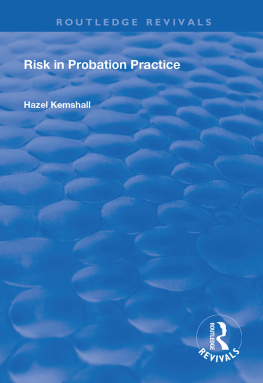SUPERVISING OFFENDERS IN THE COMMUNITY
WELFARE AND SOCIETY
STUDIES IN WELFARE POLICY, PRACTICE AND THEORY
Series Editors:
Matthew Colton, Kevin Haines, Peter Raynor, Tim Stainton and Anthea Symonds School of Social Sciences and International Development, University of Wales Swansea
Welfare and Society is an exciting series from the University of Wales Swansea, School of Social Sciences and International Development in conjunction with Ashgate, concerned with all aspects of social welfare. The series publishes works of research, theory, history and practice from a wide range of contemporary applied social studies subjects such as Criminal Justice, Child Welfare, Community Care, Race and Ethnicity, Therapeutic and Intervention Techniques, Community Development and Social Policy. The series includes extended research reports of scholarly interest as well as works aimed at both the academic and professional communities.
Supervising Offenders in the Community
A History of Probation Theory and Practice
MAURICE VANSTONE
First published 2004 by Ashgate Publishing
Published 2017 by Routledge
2 Park Square, Milton Park, Abingdon, Oxon, OX 14 4RN
711 Third Avenue, New York, NY 10017, USA
Routledge is an imprint of the Taylor & Francis Group, an informa business
Copyright Maurice Vanstone 2004
Maurice Vanstone has asserted his right under the Copyright, Designs and Patents Act, 1988, to be identified as the author of this work.
All rights reserved. No part of this book may be reprinted or reproduced or utilised in any form or by any electronic, mechanical, or other means, now known or hereafter invented, including photocopying and recording, or in any information storage or retrieval system, without permission in writing from the publishers.
Notice:
Product or corporate names may be trademarks or registered trademarks, and are used only for identification and explanation without intent to infringe.
British Library Cataloguing in Publication Data
Vanstone, Maurice
Supervising offenders in the community : a history of probation theory and practice. - (Welfare and society)
1. Probation - Great Britain - History 2. Police supervision - Great Britain - History
I. Title
364.630941
Library of Congress Cataloging-in-Publication Data
Vanstone, Maurice.
Supervising offenders in the community : a history of probation theory and practice / by Maurice Vanstone.
p. cm. -- (Welfare and society)
Includes bibliographical references and index.
ISBN 0-7546-4190-2
1. Probation--Great Britain--History. 2. Police supervision--Great Britain--History. I. Title. II. Series.
HV9345.A5V36 2004
364.630941--dc22
2004007432
ISBN 13: 978-0-7546-7174-9 (pbk)
ISBN 13: 978-0-7546-4190-2 (hbk)
For Jen
Mike Nellis
Professor of Criminal and Community Justice, Glasgow School of Social Work
Something might be learned about the status and fortunes of the Probation Service in its centenary year of 2007 by comparing the way in which it was commemorated in its jubilee year in 1957. At that point in time, 50 years on from the legislation which had brought it into being, the Service demonstrably enjoyed an unprecedented level of official prestige, although its work, then as now, was not widely known of or appreciated by the general public. There were then 104 probation areas, 1250 probation officers, supervising 45,000 offenders, 4000 children in need of care and protection and 7000 ex-prisoners being resettled. The mid-century Service, having been nurtured towards semi-professional status by the joint efforts of the Home Office and the National Association of Probation Officers (NAPO) (the latter in its early days had been supported by several aristocratic patrons) was widely regarded by the English establishment as having made a strong and valuable contribution to the administration of criminal, and indeed civil, justice, and to have an assured future. Its practice had already been emulated by a number of Commonwealth countries.
It seemed fitting then to commemorate the jubilee in grand style. A long weekend of events began with a private celebration organised by the Queen Mother at Lancaster House, and continued with more public events at the Guildhall and at NAPOs AGM at the London School of Economics. Viscount Herbert Samuel, the Under-Secretary of State who had piloted the 1907 Probation of Offenders Act through Parliament now in his nineties reminisced at the Guildhall, emphasising the extent to which probation was still a Christian vocation. There was irony in this, given the battles that both the Home Office and NAPO had fought to wrest control of probation from the Church of England Temperance Society and to distinguish police court missionaries from probation officers. It is, in part, with such mythmaking that Maurice Vanstones fine (and fine-grained) history of probation practice is concerned. The police court missionaries did play a part in the origins of the Probation Service, and the imprimature of the Anglican church, lightly restored at the jubilee, did prolong a slowly fading sense of transcendental purpose in work with offenders, which at least for a while served to insulate probation from purely secular political demands. It is Vanstones achievement, however, to show just how political policy-making towards probation has always been and to identify more clearly than hitherto the range of ideological influences which have shaped the practice of its officers.
The centenary of the Probation Service is being commemorated in 2007 through a series of professionally-orchestrated events which do not have quite the same official standing as those in the jubilee. The glory days of the Service are over; the National Offender Management Service (NOMS) is superseding it, and repudiating the best of its traditions. In the 21st century, the Service would necessarily have had to adapt to wider changes in politics and culture the logic of Vanstones own argument implies that but NOMS is by no means the only future it might have had, least of all the one to which probation tradition pointed. In 1957, Rab Butler, the then Home Secretary, wrote to NAPO commending its achievements; the present incumbent of that post, a severe critic of Probations failure to protect the public, is unlikely to do the same, and could not do so without being disingenuous.
Rab Butler rightly stressed the need for probation practice to become more scientifically based but simultaneously took for granted that it was essentially a humanising force in criminal justice, patiently helping disadvantaged people to lead more constructive and less harmful lives. In dark times, too few politicians see the need or will the means for this. Lord Ramsbotham, a former Chief Inspector of Prisons, is one of those few, and it is apt, in the present sequence of commemorative events, that he should host a reception for the friends of Probation at the House or Lords by temperament and inclination he is close in spirit to the Services former aristocratic (and soldierly) patrons. An international conference organized by NAPO and the Probation Boards Association will provide an opportunity to assess the changing structures and cultures of probation in different parts of the world and, for England, to map out futures that might have been and who knows may yet be. In the midst of this, the publication of an accessible paperback edition of






